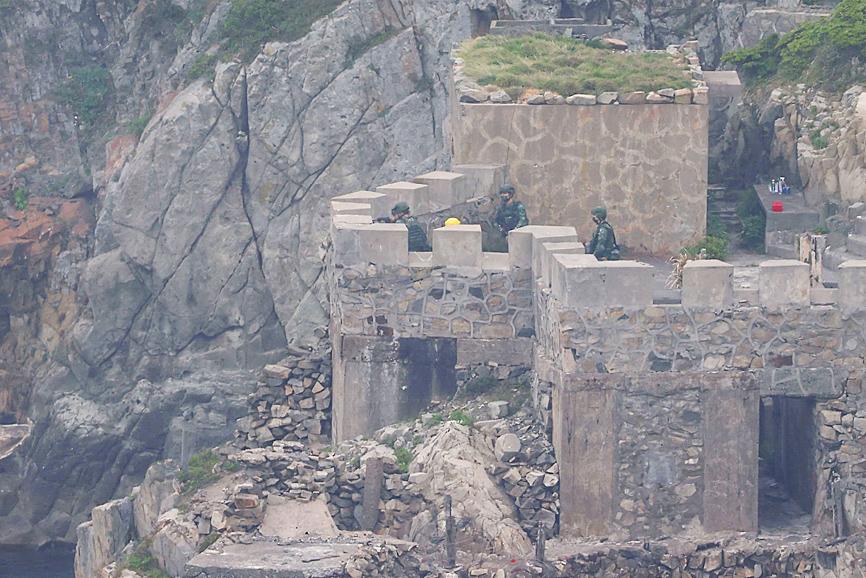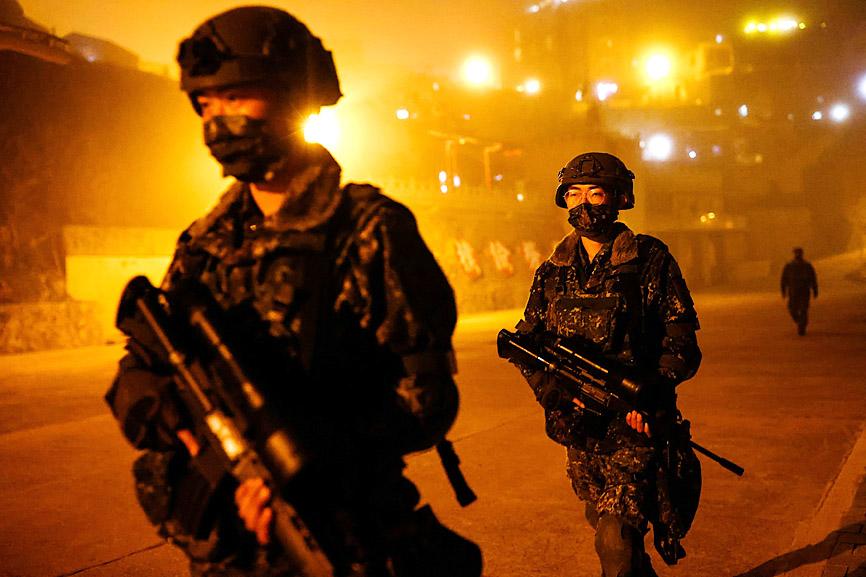Taiwan yesterday held live-fire drills in its northernmost territory, putting the spotlight on a remote island that is strategically located at a choke point near China — and potentially vulnerable to attack.
Although the Ministry of National Defense says the exercises on Dongyin Island (東引), part of the Taiwan-controlled Matsu Islands off the coast of Fuzhou, China, are routine, they are happening as Taipei has raised its alert level after Russia’s invasion of Ukraine, wary of Beijing making a similar move.
Soldiers fired shells at a floating red cross in the water, meant to represent advancing enemy forces. Piercing the calm blue sea, each shell sent spray upwards.

Photo: Ann Wang, Reuters
The echoes of machine guns, punctuated by cannon fire, reverberated around the rugged coastline.
Although Taiwan has not reported any unusual activities by Beijing since the Ukraine war began, on Feb. 5, a small, propeller-driven Chinese aircraft flew very close to Dongyin. The highly unusual event thrust the normally sleepy islet into the headlines.
Taiwan said it suspected China was deploying a civilian aircraft to test its military’s responses.

Photo: Ann Wang, Reuters
Taiwan does not publish details of its military presence there, but the Dongyin Area Command has been at the front line of Taiwan’s defenses since the 1950s.
Dongyin’s forces are equipped with Taiwan’s self-made Hsiung Feng II anti-ship missiles, as well as Sky Bow II surface-to-air missiles, making it “the most strategically important” outlying island, said Chieh Chung (揭仲), an associate research fellow at the National Policy Foundation think tank.
Rocky Dongyin, reached by overnight boat from the Port of Keelung in Taiwan’s north and home to about 1,500 civilians, sits on an important passage for any southbound Chinese forces traveling from eastern Zhejiang Province if they were to attack Taiwan.
“That’s why Dongyin is equipped with the Hsiung Feng and Sky Bow missiles. Dongyin poses a very direct threat to the Chinese communists’ air and naval movements,” Chieh said.
At a seminar in Taipei last month simulating a Chinese attack on Taiwan, retired navy rear admiral Tan Chih-lung (淡志隆) said that Dongyin’s missile sites would be among the first targets of a Chinese attack.
“The People’s Liberation Army for sure would go destroy the Hsiung Feng missile base in Dongyin,” he said. “It is a must-attack.”
A security official familiar with the deployment in Dongyin estimated that there were about 1,100 troops on the island.
“The missile base there is at the very front lines to counter any attack with our missiles. If not for that, why would we value such a small place where the port is too small for bigger military ships and where there is no airport for the air force?” said the official, who declined to be named because of the sensitivity of the matter.
A second security source said that the Chinese aircraft that got close to Dongyin had highlighted its vulnerability and proved it was of great interest to China.
“It is the key to control of the northern part of the Taiwan Strait,” the source added.
Despite the presence of troops, Dongyin is not a closed island. Tourists can explore former military tunnels, take in the stark natural beauty and go fishing.
“We are very used to these sounds,” said Dongyin Township Mayor Lin Te-chien (林德建), as he observed yesterday’s drills.
Minister of National Defense Chiu Kuo-cheng (邱國正) told lawmakers this month that China could draw lessons from the war in Ukraine and “speed up” the pace of any assault on Taiwan, perhaps attacking its outlying islands, while at the same time launching precision missile strikes on targets in Taiwan and sending troops across the Taiwan Strait.
China now has the capacity to take Kinmen and other outlying islands, Chiu said.
“But why have they not done it?” he asked. “Because they want to make sure that they can settle everything with one strike.”

Taiwan has received more than US$70 million in royalties as of the end of last year from developing the F-16V jet as countries worldwide purchase or upgrade to this popular model, government and military officials said on Saturday. Taiwan funded the development of the F-16V jet and ended up the sole investor as other countries withdrew from the program. Now the F-16V is increasingly popular and countries must pay Taiwan a percentage in royalties when they purchase new F-16V aircraft or upgrade older F-16 models. The next five years are expected to be the peak for these royalties, with Taiwan potentially earning

STAY IN YOUR LANE: As the US and Israel attack Iran, the ministry has warned China not to overstep by including Taiwanese citizens in its evacuation orders The Ministry of Foreign Affairs (MOFA) yesterday rebuked a statement by China’s embassy in Israel that it would evacuate Taiwanese holders of Chinese travel documents from Israel amid the latter’s escalating conflict with Iran. Tensions have risen across the Middle East in the wake of US and Israeli airstrikes on Iran beginning Saturday. China subsequently issued an evacuation notice for its citizens. In a news release, the Chinese embassy in Israel said holders of “Taiwan compatriot permits (台胞證)” issued to Taiwanese nationals by Chinese authorities for travel to China — could register for evacuation to Egypt. In Taipei, the ministry yesterday said Taiwan

‘LIKE-MINDED PARTNER’: Tako van Popta said it would be inappropriate to delay signing the deal with Taiwan because of China, adding he would promote the issue Canadian senators have stressed Taiwan’s importance for international trade and expressed enthusiasm for ensuring the Taiwan-Canada trade cooperation framework agreement is implemented this year. Representative to Canada Harry Tseng (曾厚仁) in an interview with the Central News Agency (CNA) said he was increasingly uneasy about Ottawa’s delays in signing the agreement, especially as Ottawa has warmed toward Beijing. There are “no negotiations left. Not only [is it] initialed, we have three versions of the text ready: English, French and Mandarin,” Tseng said. “That tells you how close we are to the final signature.” Tseng said that he hoped Canadian Prime Minister Mark Carney

POSITIVE DEVELOPMENT: Japan and the US are expected to hold in-depth discussions on Taiwan-related issues during the meeting next month, Japanese sources said The holding of a Japan-US leaders’ meeting ahead of US President Donald Trump’s visit to China is positive news for Taiwan, former Japan-Taiwan Exchange Association representative Hiroyasu Izumi said yesterday. After the Liberal Democratic Party’s landslide victory in Japan’s House of Representatives election, Japanese Prime Minister Sanae Takaichi is scheduled to visit the US next month, where she is to meet with Trump ahead of the US president’s planned visit to China from March 31 to April 2 for a meeting with Chinese President Xi Jinping (習近平). Japan and the US are expected to hold in-depth discussions on Taiwan-related issues during the